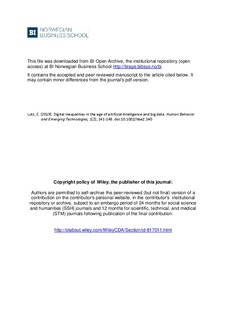Digital Inequalities in the Age of Artificial Intelligence and Big Data
Journal article, Peer reviewed
Accepted version
Permanent lenke
http://hdl.handle.net/11250/2596781Utgivelsesdato
2019Metadata
Vis full innførselSamlinger
- Publikasjoner fra CRIStin - BI [1015]
- Scientific articles [2181]
Sammendrag
In this literature review, I summarize key concepts and findings from the rich academic literature on digital inequalities. I propose that digital inequalities research should look more into labor- and big data-related questions such as inequalities in online labor markets and the negative effects of algorithmic decision-making for vulnerable population groups. The article engages with the sociological literature on digital inequalities and explains the general approach to digital inequalities, based on the distinction of first-, second-, and third-level digital divides. First, inequalities in access to digital technologies are discussed. This discussion is extended to emerging technologies, including the Internet-of-things and AI-powered systems such as smart speakers. Second, inequalities in digital skills and technology use are reviewed and connected to the discourse on new forms of work such as the sharing economy or gig economy. Third and finally, the discourse on the outcomes, in the form of benefits or harms, from digital technology use are is taken up. Here, I propose to integrate the digital inequalities literature more strongly with critical algorithm studies and recent discussions about datafication, digital footprints, and information privacy. Digital Inequalities in the Age of Artificial Intelligence and Big Data
